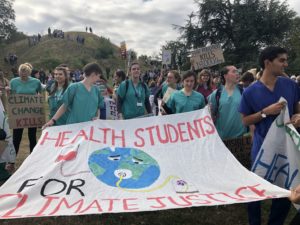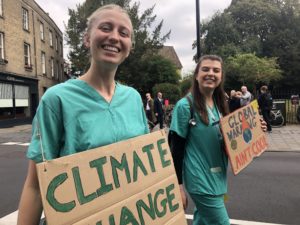Medical students and healthcare professionals have a responsibility to act on the climate crisis
 Last week, medical and healthcare students across the world stood in solidarity with the global youth climate strike. We are increasingly concerned about the harmful impact of the climate crisis on the health of our patients and the population. Therefore, as both students and future healthcare professionals, we made the decision to join the youth strikes. This decision was not made lightly. We acknowledge our responsibility to our patients and the healthcare community. Any students with clinical commitments did not attend the strikes. However, we also believe this responsibility means that we cannot simply ignore the climate emergency. Many students and healthcare professionals chose to take leave or use their free time in order to express concern for the critical health threat posed by the climate crisis and the need for rapid climate action in the healthcare sector and beyond.
Last week, medical and healthcare students across the world stood in solidarity with the global youth climate strike. We are increasingly concerned about the harmful impact of the climate crisis on the health of our patients and the population. Therefore, as both students and future healthcare professionals, we made the decision to join the youth strikes. This decision was not made lightly. We acknowledge our responsibility to our patients and the healthcare community. Any students with clinical commitments did not attend the strikes. However, we also believe this responsibility means that we cannot simply ignore the climate emergency. Many students and healthcare professionals chose to take leave or use their free time in order to express concern for the critical health threat posed by the climate crisis and the need for rapid climate action in the healthcare sector and beyond.
The consequences of climate change can be seen in almost every aspect of health; e.g. malnutrition, cardiovascular disease, respiratory diseases and allergies. [1] Seven million people die solely as a result of exposure to air pollution annually, and the human toll of climate change is increasing. [2] At the same time, climate change mitigation and adaptation have so-called “health co-benefits.” Reduction of greenhouse gas emissions, increased active transport and healthy sustainable diets lead to improved health outcomes and reduced mortality while improving our environment. Planetary and human health are intimately connected. [1] Yet, there seems to be a general lack of awareness in our communities on these climate sensitive health outcomes and the health benefits of climate action.
 Medical and public health professionals have a particular responsibility to advocate for climate action. Firstly, healthcare professionals are in a special position to communicate the risks of climate change to the wider public. Tackling climate change is an overwhelming task that can leave many people feeling powerless. Others may see it as a distant, future problem. We believe a health perspective offers a way to make climate change relatable. Seemingly arbitrary cut-off points can be contextualised by rooting discussion in people’s own lives. This increases engagement and provides positive motivation for climate action.
Medical and public health professionals have a particular responsibility to advocate for climate action. Firstly, healthcare professionals are in a special position to communicate the risks of climate change to the wider public. Tackling climate change is an overwhelming task that can leave many people feeling powerless. Others may see it as a distant, future problem. We believe a health perspective offers a way to make climate change relatable. Seemingly arbitrary cut-off points can be contextualised by rooting discussion in people’s own lives. This increases engagement and provides positive motivation for climate action.
Secondly, healthcare is a major producer of climate emissions, accounting for 4.4% of the global total. [3] Although the UK’s health and social care sector has reduced emissions by 18.5% between 2007 and 2017, the NHS is still responsible for 5.4% of the country’s climate footprint. [4,3] Major sources of emissions include the procurement of goods, waste disposal, building energy requirements and travel. These also contribute to air pollution, which is now the fifth-leading risk factor for mortality globally. [5] Even in the UK, a country with relatively strict environmental regulations, air pollution is the biggest environmental threat to health, leading to approximately 64,000 deaths in 2015. [6] Against this backdrop, the NHS accounts for 3.5% of all road travel in England: a staggering 9.5 billion miles of road travel each year. [3]
 The NHS Sustainable Development Unit has identified key areas for emissions reductions. These include improving supply chain efficiencies, refurbishing buildings to reduce energy requirements, encouraging active travel and use of public transport, and reducing wastage. Despite this, the rate of emissions reduction is behind the trajectory needed to achieve the Climate Change Act 2020 target of 34%. [4] In addition, a strategy to completely eliminate net emissions from the healthcare sector is urgently needed, and this requires the support of healthcare professionals.
The NHS Sustainable Development Unit has identified key areas for emissions reductions. These include improving supply chain efficiencies, refurbishing buildings to reduce energy requirements, encouraging active travel and use of public transport, and reducing wastage. Despite this, the rate of emissions reduction is behind the trajectory needed to achieve the Climate Change Act 2020 target of 34%. [4] In addition, a strategy to completely eliminate net emissions from the healthcare sector is urgently needed, and this requires the support of healthcare professionals.
Educating the next generation of healthcare professionals on the importance of sustainability and climate communication will be crucial in making this transition to a zero-carbon healthcare system.
The 2018 GMC Outcomes for Graduates states that “Newly qualified doctors must be able to apply the principles, methods and knowledge of … sustainable healthcare to medical practice.” [7] However, most medical schools are yet to make adequate changes to the curriculum. Demonstrating that there is demand for this teaching among the student body is vital. Those of us who took part in the strike in Cambridge, and many others who were unable to attend due to clinical commitments, signed a letter to our medical school requesting support for our decision to strike. The significant number of students who added their voices to the growing global movement today emphasises the importance and urgency of this curriculum change to medical institutions.

Healthcare professionals are in a unique position to inform, engage and educate. We welcome the progress that has already been made. Last week’s announcement by the RCGP of a new task group to assess the impact of climate change on health in primary care is encouraging. However, we are running out of time. We are calling for the entire healthcare sector to unite and demand urgent action to safeguard the health of our future patients.
Chloe Legard, Madeline Green, Yanish Tucker and Kim van Daalen are medical students and a Public Health PhD student at the University of Cambridge. They are part of the group Healthy Planet Cambridge, which focuses on raising awareness on the interlinkage between climate change and human health.
References
- Watts, N., Adger, W. N. & Agnolucci, P. Health and climate change: Policy responses to protect public health. Environnement, Risques et Sante 14, 466–468 (2015).
- Forouzanfar, M. H. et al. Global, regional, and national comparative risk assessment of 79 behavioural, environmental and occupational, and metabolic risks or clusters of risks, 1990–2015: a systematic analysis for the Global Burden of Disease Study 2015. Lancet 388, 1659–1724 (2016).
- Health Care Without Harm. Health care climate footprint report. (2019). https://noharm-global.org/documents/health-care-climate-footprint-report.
- Sustainable Development Unit. Natural Resource Footprint. (2018). https://www.sduhealth.org.uk/policy-strategy/reporting/natural-resource-footprint-2018.aspx.
- Health Effects Institute. State of Global Air. (2019). https://www.stateofglobalair.org/report.
- Lelieveld, J. et al. Cardiovascular disease burden from ambient air pollution in Europe reassessed using novel hazard ratio functions. Eur. Heart J. 40, 1590–1596 (2019).
- General Medical Council. Outcomes for graduates. (2018). https://www.gmc-uk.org/education/standards-guidance-and-curricula/standards-and-outcomes/outcomes-for-graduates.
